An Expert Shares 5 Things You Never Knew About Acne

Source: srisakorn wonglakorn/Shutterstock
Helping you to improve your acne is our mission – we know it can be a major confidence killer. Acne myth number one: only teenagers get acne – this could not be more wrong; it’s almost as common in women of all ages as it is in teenagers. So, whether you’re 13 or 30, we’re here to get to the bottom of what’s causing your acne. We spoke to celeb dermatologist and author of Beyond Beautiful, Dr. Doris Day, for the lowdown on what could be causing your acne and what you can do to improve it.
1) Your hair products could be causing spots
When I see acne around the hairline and periphery of the face, this could be something called “pomade acne” and it’s due to hair oils and gels or other products in the scalp that end up on the face and block pores, causing a breakout. If this is the case, ensure you’re always thoroughly washing products out of your hair and concentrate serums and oils at your ends. If acne is in the central face and forehead, that is more typical of teenage acne and can be due to hormones, stress and other factors we don’t yet fully understand.
2) Evening primrose oil could help your acne
Evening primrose oil is high in essential fatty acids especially omega-6. It comes from pressing the oils out of the seeds and putting that into a capsule. The idea is that it helps regulate hormones, some of which are responsible for hormonal acne. However, there are other sources of Omega-6 that could theoretically do the same things, so there’s nothing special about this oil that separates it from those other ingredients. A reasonable dose is 1,500mg per day and adding it in along with a healthy diet may have a positive impact, but it’s always good to speak with your doctor to check hormones and determine the best program and regimen for you. If applied topically it has some anti-inflammatory properties depending on the concentration, but the formulation matters – if it’s in a formulation that is occlusive (blocks pores) it can make acne worse, so look for one that is designed and tested for acne.
3) Not all acne is due to hormones
One of the questions we ask when evaluating a patient with acne, is: Is it worse around your period? If that is the case, and if the acne is distributed more along the jawline and upper neck area, that is a very strong sign that the acne is due to a hormonal imbalance or trigger. The blood hormone levels are nearly always normal, but it is still a hormonal effect. In cases where we also see hair loss on the scalp, excess hair growth on the face and body, irregular or very heavy periods and weight gain, that is a sign of possible polycystic ovarian syndrome and needs to be addressed. One of my favorite treatments for this is Spironolactone. It is not made for acne but it helps block the hormone receptors, and this helps dramatically reduce breakouts. It takes a few months to kick in, but it has been an outstanding addition to acne care.
4) Dairy could be making your acne worse
Dairy has been shown to make acne worse. It seems to be the milk proteins, not the milk fat, so switching to low fat doesn’t help. Sheep and goat milk doesn’t have the same effect as cow milk, so those are ok. Eating pizza and greasy food does not make you break out unless you rub the grease directly on your face – thank the gods!
5) Dehydration is making your skin oilier
Drinking plenty of water is essential, but drinking water alone will not get rid of your acne. Acne is caused by a culmination of factors which lead to overactive sebaceous glands and an increase in oil production and then pores become plugged by the oil, and finally, bacteria become trapped. When your skin is dehydrated, it produces more sebum to lubricate your skin, so it’s better to moisturize and nourish your skin with the right moisturizing formulas. Hyaluronic acid is an excellent hydrator, and although it’s not a direct acne treatment, it will help to control your skin’s oil production. It’s also perfect if you’re in your 20s or above as it can help to plump fine lines.
Check out these 5 acne-fighting tips from Dr. Doris Day here.























Leave a comment